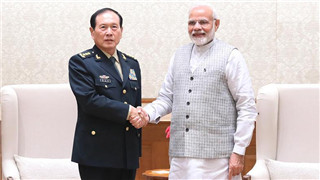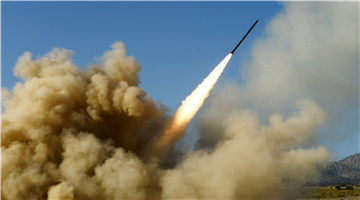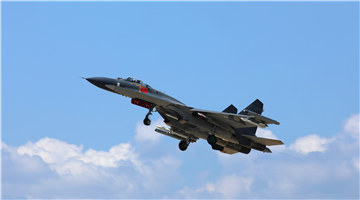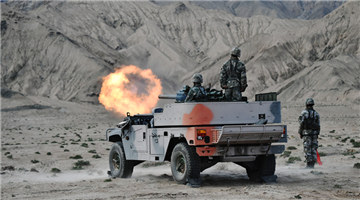By Shi Hong
US President Donald Trump and Vice President Mike Pence have announced recently the creation of a new Space Force as an independent military service. On August 9, Pence even made it clear that the US will strive to establish the branch by 2020.
The US Department of Defense (DoD) issued an evaluation report later in the day stating that the Space Force would be established in four steps with the first step to create the US Space Command in order to consolidate and develop space combat forces.
However, the plan to establish the Space Force is not widely supported by many Americans who have expressed their opposition and raised three main concerns.
The first is the issues of legitimacy and strategy. The US is one of the State Parties to the Outer Space Treaty of 1967, which prohibits the parties from deploying weapons of mass destruction (WMD) in space and allows the use of the Moon and other celestial bodies for peaceful purposes only.
However, the US government insists on forming a Space Force based on the reason that "space is another domain of war as important as land, sea, and air". The report released by the DoD directly set "the deployment of a new generation of weapons to support combat forces" as a strategic goal of the Space Force. Consequently, mankind may not realize their wishes to use space peacefully, and space will potentially become the next global battlefield.
Since military conflicts have never occurred in space in human history, the "space warfare" envisaged by the US is facing some specific questions. For example, is the strike against US equipment in space equivalent to a strike against the US itself? How to treat space assets belonging to individuals, foreign or international organizations? The US and the international community have to reach consensus on such questions in order to avoid misjudgment.
The second is about the mission positioning of the Space Force. Does the Space Force protect American assets in space only, or act as a space-based strategic strike and defense force, or even undertake anti-missile mission? The US has yet given answers to these questions.
However, if the position statement of the Space Force is unclear, it will be challenging to create the Space Force as different positioning statements mean huge difference in organizational structure, force scale, and equipment technology development.
On top of that, mission positioning is also related to the distribution of interests among military services and government departments. For example, if the Space Force undertakes anti-missile missions, will the "Terminal High Altitude Area Defense" (THAAD) and the "Patriot Advanced Capability-3" (PAC-3) missile system of the US Missile Defense Agency (MDA) and the US Army, as well as the "Standard Missile-3" (SM-3) missile system of the US Navy be placed under the Space Force? If the interests among military services and various government departments cannot be coordinated properly, the Space Force will not be able to play its role effectively even if it is established eventually.
The third is about the budget allocation. Although the US military expenditure accounts for nearly half of the military budget in the world, competition for budget is fierce among military services since each service emphasizes its own importance and tries to get bigger budget.
If the Space Force is an independent branch with its own secretary as those of the US Army, Navy and Air Force, this new and high-tech service will further intensify the budgetary struggle among military services; if the Space Force is under the Air Force and equipped like the Marine Corps with only military officers, it will have to face the same "destiny" as the Marine Corps as more budget is likely to be distributed by the Department of the Air Force (DAF) to the Air Force, and thus limiting the development of the Space Force.
In addition, building the Space Force into an independent branch will also make the US military agencies more redundant, increase a large number of positions and unnecessary costs, aggravate military bureaucratization, and bring no benefits to joint operations in future battlefields.
It should be emphasized that although the US has received strong opposition at home to the establishment of an independent Space Force, it has been consistent throughout the community in its goal of strengthening the advantage in space.
For example, US Secretary of Defense James Mattis had previously opposed the establishment of the Space Force due to concerns about the bureaucratization of the military, but he changed his attitude during his visit to Brazil this time. This is mainly because he always acknowledges the need to change the structure and mindset of the previously-criticized space defense force so as to "defend the economic and security interests of the US in space", and the establishment of a Space Force is only a means to achieve this goal.
It can be seen that the debate in the US about the building of a Space Force is actually about how the US should march toward the militarization of space. The US government’s "Space Force Program" has sounded the alarm for the international community, and peace and tranquility in space is under its greatest threat.
Disclaimer: The author is the executive editor of the Shipborne Weapons. The article is translated from Chinese into English and reedited by the China Military online. The information, ideas or opinions appearing in this article are those of the author and do not reflect the views of eng.chinamil.com.cn. Chinamil.com.cn does not assume any responsibility or liability for the same. If the article carries photographs or images, we do not vouch for their authenticity.











